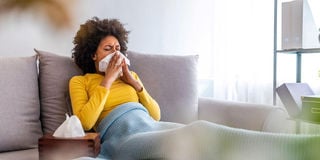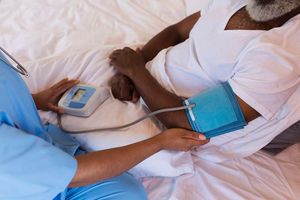How to care for a Covid-19 patient at home

What you need to know:
- Room should be well-ventilated
- Limit's patient's movement
- Assess caregiver's immune system
- Wear an N-95 mask
- Avoid contact with bodily fluids
- Clean and disinfect surfaces regularly
In June 2020, the government of Kenya introduced home-based care and isolation for patients with Covid-19.
This health program is intended to help manage the spiralling cases of Covid-19 without overwhelming the local health system.
There are however certain rules and regulations.
Eligibility
According to the Ministry of Health, patients who have been medically assessed by an official health worker should meet the following eligibility requirements for home-based care:
i) be confirmed to have Covid-19 at a licensed medical laboratory.
ii) be asymptomatic or with mild symptoms of Covid-19.
iii) have sufficient space at home for self-isolation.
Basic care
If you have a Covid-19 patient at home, you should set aside a room where they can recover without coming into contact with other persons in the house. This should also include a separate bathroom and toilet where possible.
The guidelines further stipulate that to minimise the chances of transmission, all household members should have and use personal protective equipment, which at the very least should include gloves and face masks.
“The home area should be equipped with a thermometer which can be easily interpreted. Everyone at home should be able to adhere to precautions such as respiratory hygiene, cough etiquette, and hand hygiene,” the guidelines say.
With specific members of the society more vulnerable to Covid-19 than others, there are categories of people who should not live under the same roof as a Covid-19 patient.
This includes people aged 65 years and above or under the age of two; pregnant women; people with chronic diseases (heart, lung, kidney conditions or diabetes); and people whose immune system is compromised. This is because their chances of getting an infection rise significantly if they get exposed to a Covid-19 patient.
8-point care
If you have a Covid-19 patient, the Ministry of Health recommends that:
1) You place the patient in a dedicated or isolated room that is well ventilated. This means that it should have windows that can open to increase air circulation. Increased air circulation helps get rid of respiratory droplets in the air.
2) You limit the movement of your Covid-19 patient within other rooms or areas in the house as well as that of other people into the patient’s room. This also includes limitation on the use of shared utilities.
3) Since your Covid-19 patient will need to be attended to, the person to interact with them should be in good health and not have a weak immune system or chronic disease.
4) To contain respiratory secretions, your patient must always use a surgical mask. If he or she cannot tolerate wearing surgical masks due to their health, the ministry guidelines recommend that they practice rigorous respiratory hygiene.
This means that the Covid-19 patient should cover their mouth and nose with disposable paper tissue when coughing or sneezing, before and after interacting with their primary caregiver.
“Materials used to cover the mouth and nose should be discarded or cleaned appropriately. For example, if they use a handkerchief, ensure that they wash it using regular soap or detergent and water,” the Ministry of Health says.
5). When caring for a Covid-19 patient, you should wear a tight-fitting N95 mask when in the same room with your patient. This mask ought to cover your mouth and nose.
Don’t touch your mask or attempt to position it when it is in use. Tampering with your mask when in use increases the risk of infection from contaminating.
If the mask gets wet or dirty from secretions, MoH recommends that you replace it immediately with a new clean, dry mask.
“Remove the mask using the appropriate technique – that is, do not touch the front, but grasp the bottom elastic of the N95 mask then the ones at the top, and remove without touching the front,” the ministry says.
6) Strive to avoid direct contact with body fluids, particularly oral or respiratory secretions.
Use disposable gloves and a mask when providing oral or respiratory care and when handling stool, urine and other waste.
After caring for the patient, ensure hand hygiene before and after removing your gloves and mask.
Hand hygiene involves thoroughly cleaning your hands with soap and water, and where hands appear clean, sanitise with an alcohol-based sanitiser.
7) Always clean and disinfect bathroom and toilet surfaces, at the very least, once daily or immediately after the toilet is used.
For thorough cleaning, you should use household soap or detergent for your first round of cleaning.
Thereafter, you should rinse your toilet with household disinfectant which should contain chloride bleach.
When cleaning, MoH recommends that you use heavy-duty gloves and protective clothing such as plastic aprons.
This is the same gear you should have on you when changing your patient’s beddings or when handling their clothes. Afterwards, the gloves and aprons should be cleaned with soap, water and disinfectant.
8) When doing general cleaning at home, focus on surfaces and objects that are most likely to be touched such as tables, remote controls, counter tops, doorknobs, handles, phones, and light switches.
When to seek medical attention
When you are caring for a Covid-19 patient, keep monitoring their basic condition and recovery process.
Usually, an asymptomatic patient will be required to stay isolated for at least two weeks.
During this period, their temperature must be regularly checked and recorded.
According to the Centre for Disease Control, you should seek medical help if you notice that your patient has trouble breathing, persistent pain or pressure in their chest, is experiencing trouble staying awake or is unable to stay awake.
Your own health
It can be so easy to prioritise your patient’s health and forget your own. Ensure you keep tabs on your own health, especially since you are interacting with a Covid-19 patient.
Monitor yourself for any symptoms of Covid-19 such as fever, cough, shortness of breath, and loss of senses for taste and smell.
Once your Covid-19 patient has fully recovered the CDC recommends that you self-isolate for at least 14 days to ensure that you did not contract any infection during the period of care.




